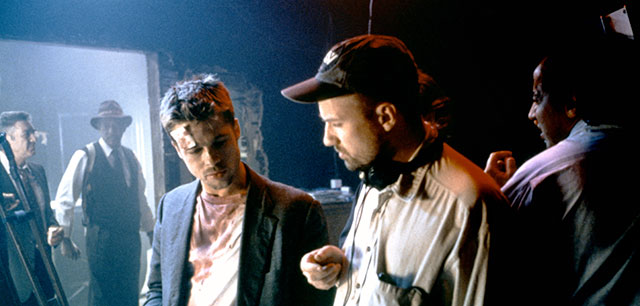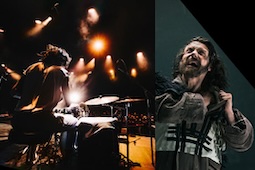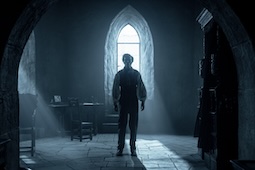
Few directors peer into human darkness with as much panache as David Fincher. Having graduated from commercials and music videos (Madonna's Vogue), Fincher's nihilistic style was first exemplified in the flawed Alien3 (1992), before he announced himself with the bleakly terrifying Seven (1995).
Fincher's hallmarks are now legendary: scrupulous use of light and shade to create unease, a subtly all-encompassing sound design to work on our nerves and a tendency to get career-best performances out of his actors, often by requiring Stanley Kubrick levels of takes to reduce what Fincher calls 'self-consciousness' in front of the camera.
Technically scrupulous though his films are, it's Fincher's love of dark thematic material that gets us. Seven is a Dante-esque allegory for a descent into hell, set in an unnamed city, while Zodiac (2007) probes an unseen, real-life killer's motives while keeping the culprit avowedly in the shadows.
In short, Fincher is good at making us feel bad, at taking us to the dark side. We're celebrating four of his most acclaimed films in our Fincher Season and you can enjoy each movie for just £5 per ticket (plus a 95p online booking fee).
To get you in the mood, we've selected a classic scene from each of the films being shown. Scroll down to find out what they are. (This may entail spoilers if you haven't seen the film.)
1. "Is there someone else in the house?" (Zodiac, screening January 7th)
It takes a lot of chutzpah to make a near-three-hour movie based on a real-life murder case where the culprit got away scot-free. However, Fincher recognises that it's the morbid, horribly compelling details around the journey, more than the destination, that get us hooked on true crime stories.
Zodiac is the exemplar of this philosophy, quite possibly the director's finest film although it underperformed at the box office due to its challenging subject matter. This is a movie that requires more than passive spectatorship, instead demanding our attention and inviting us into the headspace of the three men who lost their souls in pursuit of the infamous Zodiac killer.
Fincher and screenwriter James Vanderbilt do a remarkable job in stitching together a mountain of decades-long evidence and eye-witness testimonials to depict the panic that gripped the late-1960s San Francisco Bay area as the mocking psycho went on a killing spree, taunting the under-resourced police and newspapers with ciphers alluding to their identity.
Handsomely filmed on digital by DP Harris Savides (the Marvin Gaye-soundtracked time-lapse sequence is a beauty), the film also scores in its central casting. Jake Gyllenhaal is the naive yet tenacious cartoonist Robert Graysmith, on whose book the film is based, whose investigation is persuasive but agonisingly indeterminate in pointing to a likely suspect.
The scene when Graysmith appears to be closing in on his man with help from a sinister projectionist (Charles Fleischer) is nail-bitingly suspenseful. It's a reminder of Fincher's skills in about-facing from an apparently ordinary conversation into a far more dangerous scenario where murder and mayhem seemingly lurk around the next corner.
2. "What's in the box?" (Seven, screening January 10th & January 14th, and also in IMAX)
Here's a candidate for the most horrifying movie ending of the 1990s, and to think it very nearly didn't happen. The bone-chilling and upsetting conclusion to Fincher's breakout film Seven only came about because star Brad Pitt insisted that it remain; queasy studio executives were nervous about its overtones, but it arguably helped cement the movie as a modern classic.
Seven, written by Andrew Kevin Walker, takes place in a rain-soaked urban sprawl and presents us with the most cliched set-up imaginable. An old cop on the verge of retirement, Somerset (Morgan Freeman), is reluctantly paired with a hot-headed rookie, Mills (Pitt), as they go on the hunt for a sadistic serial killer who is targeting people based on the principle of the seven deadly sins.
As with all David Fincher films, the devil is in the details. The key lies in the world that Fincher creates: everything is moldering, seedy and decrepit, a sobering reminder that the movie's sadistic John Doe (as he's dubbed) has the potential to emerge from any filth-ridden alleyway or rundown tenement building. Which one of the scurrying background extras has the potential to be our suspect? The film's menace and sense of existential doom are predicated on the fact that it could be anyone.
It is, in short, a hell on Earth (Dante's nine circles are liberally referenced) where morality has long taken a backseat. Freeman's noble but increasingly jaded Somerset, who has lived in the city for "too long", in his words, is our Virgil-esque guide. Freeman's outstanding performance is a surrogate for the audience as the murder investigation takes increasingly twisted turns, any sense of redemption steadily washing away like the incessant rain hitting the sidewalk.
Credit to cinematographer Darius Khondji, production designer Arthur Max and composer Howard Shore who make us feel the decay, both physical and spiritual, in our bones. In a movie laden with horrible ironies, the fact that the final revelation takes place in the desert in broad daylight is perhaps the most horrible of all.
3. Amy reveals her motives (Gone Girl, screening January 21st)
The notion of identity lies at the heart of Fincher's movies. Seven questions how one's shallow conception of 'innocent' stacks up against a city in which crime and depravity are rampant. The filmmaker's coruscating and controversial Fight Club (1999), adapted from Chuck Palanuik's novel, is even more explicit, pitting Edward Norton's blandly materialistic and unnamed Narrator against Brad Pitt's anarchistic, soap-making Tyler Durden, before suggesting that the complicity between the two runs deeper than imagined.
Gone Girl (2014), adapted by author Gillian Flynn from her novel, also runs with this compelling notion. It asks, how mutable are we, what society expects from us, how easy is it to hide in plain sight masquerading in line with social norms, and what it takes to tap into our true nature before disappearing off the map completely. All juicy ideas, and in the hands of Fincher and Flynn, it's a nasty delight, a vibrant cocktail laced with venom.
The film's misanthropic and blackly comic streak comes to a head during the pivotal mid-narrative twist. It turns out that married dullard and tabloid target Nick (Ben Affleck) didn't kill his wife Amy (Rosamund Pike), as we've been led to believe. Instead, the film breaks its chronology to flashback and show us how Amy staged the whole thing.
The mechanics of the reveal strike those notes of pleasure that we've come to expect from classic mystery thrillers. However, Pike's deliciously icy narration probes even deeper, resonating with deep-seated contempt as she constructs her victim narrative to lash out against her dull-witted husband and the parents who co-opted her life for the bestselling Amazing Amy books.
The fact that she has to exploit the local "pregnant idiot" and steal her urine to make the master plan complete doesn't seem to register on a moral level. Amy is not only playing her husband and the media for fools. She is actively trashing the social construct known as 'cool girl', the idealised archetype of the doting wife.
In one fell swoop, the movie gravitates from a twisty, pulpy thriller into a lacerating study of psychological make-up, motivation and marriage. The real mystery resides not in where Amy has gone. It lies in what she has become, and how insidious social pressures can make monsters of us all.
4. Mark and Eduardo break up (The Social Network, screening January 28th)
As an elevator pitch, the story of the creation of Facebook sounds pretty dull. Put it in the hands of visual stylist Fincher and verbal duellist Aaron Sorkin, however, and you get fireworks, a movie that takes insular coding and content creation and transforms it into a state-of-the-world address.
It all stems from a drunken, chauvinistic reaction to being dumped, evolves into a Harvard-wide social media tool, prompts a complex lawsuit and soon mutates to take over the entire world. One might dispute the facts of Sorkin's script, even though it's taken from a source (Ben Mezrich's The Accidental Billionaires), but one cannot deny the film's pulsating level of energy.
The film does a terrific job tapping into the fin de siecle, early-2000s spirit of tech pioneers like Mark Zuckerburg (emphatically played by Oscar nominee Jesse Eisenberg) and Napster founder Sean Parker (Justin Timberlake). For better or for worse, these people changed the entire world and in classic morality play fashion, the film comes to lament the human cost of their materialistic success.
In collapsing the barriers between social communication, Zuckerburg ironically isolates himself through sheer hubris and greed. This is most keenly felt through the collapse between Zuckerberg and his business partner Eduardo Saverin (Andrew Garfield), the closest thing the film has to a moral compass.
The ongoing legal case between Zuckerberg and Saverin acts as the backbone of the movie's flashback/flashforward narrative structure. Garfield's terrific performance channels the disconnect and despair when technology compels people to talk at each other but not to each other, resulting in mistrust, anger, despair and betrayal.
It ensures that the movie retains an empathetic spine amidst the onslaught of materialistic success, frantic typing and corporate sleekness.
BOOK THE SOCIAL NETWORK TICKETS
Has that whetted your appetite for more movies? Then visit the link below to discover 25 unmissable movies coming your way in 2025.












.jpg)
.png)






